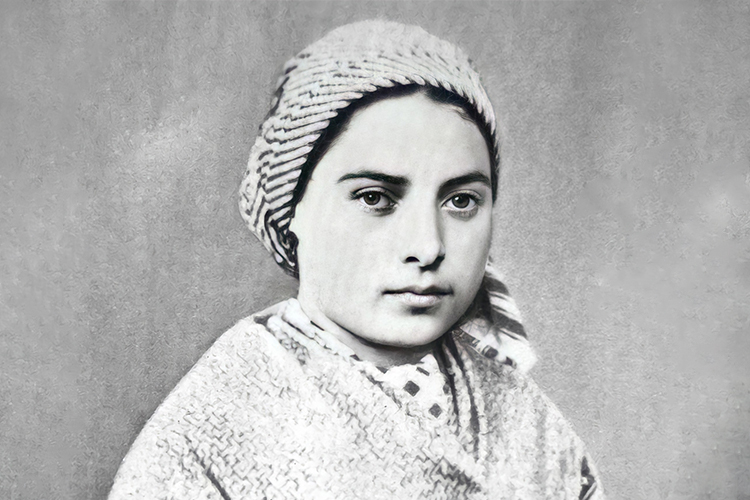
April 16
St. Bernadette Soubirous
Life (1844-1879)
We can’t think of Lourdes without thinking of the 14-year-old girl to whom Our Lady appeared there in 1858 - Bernadette Soubirous.
St. Paul wrote, “God … singled out the weak of the world to shame the strong.” (I Cor. 1:27). In her apparitions to various people, Mary has followed the same policy. She has never revealed herself to presidents or potentates or plutocrats. She has chosen simple but substantial people, whether men or women or children.
Bernadette Soubirous of Lourdes was just such a person. A teenager who was physically frail and who, at that point, had not yet learned to read or write, or even studied her catechism or made her first Holy Communion! Bernadette was nevertheless solid, balanced and docile. A good one, in other words, to be sent as Mary’s ambassador to urge Catholics to prayers and penance for sinners, and to urge the local clergy to set up a chapel at the riverside grotto of the apparitions.
In exchange for Bernadette’s prophetic role, Mary did not promise her to make her happy on this earth, only in the next. Bernadette began to experience frustrations during the apparitions themselves, in the form of excessive pestering by the curious people who flocked to the new shrine. But when the apparitions ceased, the young girl sought to escape from this turmoil. By then her embassy was basically accomplished. Now she wanted to hide from the world - to be retired, she said, as an old broom is retired behind the door.
At the age of 18, Bernadette sought entrance into the Sisters of Notre Dame at Nevers. However, she could not be completely anonymous even there. The very nuns of her religious community sometimes expected her to be proud because of her special graces. But she would point out, “Don’t I know that the Blessed Virgin chose me because I was the most ignorant? If she had found anyone else more ignorant than me, she would have chosen her.”
Although St. Bernadette’s mission was officially finished in July, 1858, she had the continuing duty of living up to Mary’s injunctions, and of thus setting an example for others. As a nun, she sought to fulfill perfectly the rule of her community. She accepted even her chronic illness in that light. Thus, on a certain day, one of her superiors, finding her in bed because of her serious ailments, twitted her, “What are you doing there in bed, you lazy little thing?” Sister Marie Bernarde (her name in religious) replied, “Why my dear Mother, I’m doing my job.” “And what is your job?” “Being ill” said Bernadette.
Always a vital part of her own “prayers for sinners” was the rosary, which she constantly recommended to all. Part of the rosary was the sign of the cross. Whether in the rosary or at any other time, from the days of the Lourdes apparitions on, Bernadette was noted for the wonderful way she made the sign of the cross. One observer at the grotto later wrote, “If the sign of the cross is made in heaven, it can only be made in this manner.” Everybody marveled at the way she crossed herself - slowly, reverently, “with majesty.” “It is important to make it well,” she told one of her fellow novices in the convent. The sisters respected the way she blessed herself, because they knew who had taught her. It was Our Lady herself, during the Lourdes apparitions.
Do we make the sign of the cross often? (Do you know that we can obtain a partial indulgence, applicable, if we choose, to the souls in purgatory, every time we make it?) Why not take on the project of always blessing ourselves slowly and reverently, pondering meanwhile what that sign means?
If we offer up these signs of the cross for the conversions of sinners, we will also be corresponding with what Our Lady of Lourdes asked of us through her humble ambassadress, Bernadette Soubirous. --Father Robert F. McNamara
Scripture (Song of Songs 2:1014)
My beloved spoke and said to me,
“Arise, my darling,
my beautiful one, come with me.
See! The winter is past;
the rains are over and gone.
Flowers appear on the earth;
the season of singing has come,
the cooing of doves
is heard in our land.
The fig tree forms its early fruit;
the blossoming vines spread their fragrance.
Arise, come, my darling;
my beautiful one, come with me.”
My dove in the clefts of the rock,
in the hiding places on the mountainside,
show me your face,
let me hear your voice;
for your voice is sweet,
and your face is lovely.
Writings